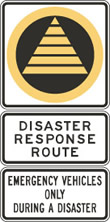Disaster Response Route
 From Wikipedia - Reading time: 4 min
From Wikipedia - Reading time: 4 min

Disaster Response Route (DRR) is a network of pre-identified municipal and provincial roads in the Province of British Columbia, Canada that can best move emergency services and supplies to where they are needed in the event of a major disaster.[1] These roads are part of the Coordinated Regional Emergency Transportation Strategy and are intended for emergency responders when a disaster strikes and are not evacuation routes for the public.
History
[edit]
DRR came to the Province after witnessing the traffic mayhem after disasters like the 1989 San Francisco and 1994 Los Angeles earthquakes; and the September 11 terrorist attacks. It was decided that BC will require a system to control post-disaster traffic and BC became the first jurisdiction in the world to implement a disaster response road plan in 1995.[2] In the original plan, only Vancouver roads were considered but eventually expanded to marine routes, railways and air transports.
DRR roads are capable of withstanding natural disasters and the roads all link to Abbotsford, more specifically to Abbotsford International Airport.[3] While DRR consists mostly of roads, emergency plans also includes marine routes suitable for quick access for responders.[4]
There was confusion since the launch of the program with the general public - the original sign did not include the third tab (Emergency Vehicles Only During a Disaster) which led many to believe these roads are for evacuation when disaster strikes.[5] Since 2004, the Ministry of Transportation added the third tab and increased public awareness to promote the correct use of these roads during a disaster.
Operation
[edit]Roads that are pre-marked as DRR are open to the general public unless a state of emergency was declared by the municipal or provincial government. Once a state of emergency is declared, DRR can be activated and the local police will be responsible for cordoning off the roads. As soon as possible, the public will be allowed back onto the Disaster Response Routes.
DRR is intended for those who have the following function to access the roads within 72 hours of a disaster strikes:[6]
- Transport/diagnose/treat sick & injured
- Transport displaced persons
- Maintain law and order
- Extinguish fires & control hazards
- Control traffic & evacuations
- Search and Rescue
- Protect public health and prevent spread of communicable diseases
- Assess damage
- Restore damaged transportation systems
- Restore communications infrastructure
- Restore water/gas/electricity supplies
- Manage any of the above
Specifically, 'DRR users' are categorized into 3 groups:[7]
- First Responders - designated responders
- British Columbia Ambulance Service
- Fire & Rescue
- Police
- Key management staff
- Critical Service Providers - designated responder for the duration of the emergency
- Provincial Emergency Program volunteers
- Hospital staff
- Traffic controllers
- Public Works personnel
- Public Health officials
- Utility (hydro, electricity, etc.) crews
- Specialist Responders - designated responder only when called upon and only when performing specific recovery-related tasks
- Canadian Forces
- Canadian Coast Guard
- Structural engineer inspectors
- Technicians
- Supply delivery personnel
- Maintenance Crews
Once activated, only those who have been issued with DRR hangers (for automobiles) or DRR decals (on Driver's license, employee ID or government IDs) will be able to access the designated roads.[8]
See also
[edit]References
[edit]- ^ "Disaster Response Routes". Archived from the original on 2008-08-20. Retrieved 2008-08-10.
- ^ Information for Responders - Part I Archived June 11, 2011, at the Wayback Machine
- ^ Disaster Response Route Video Archived December 31, 2006, at the Wayback Machine
- ^ On Guard for Thee
- ^ Information for Responders - Part II Archived June 11, 2011, at the Wayback Machine
- ^ Short Sea Shipping and Disaster Response Route[permanent dead link]
- ^ Operationalizing Disaster Response Routes in British Columbia Archived July 6, 2010, at the Wayback Machine
- ^ Distribution of DRR Identification Archived June 11, 2011, at the Wayback Machine
 KSF
KSF